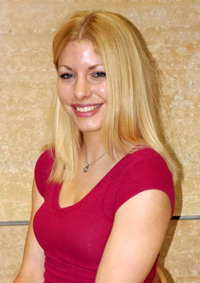 |
Julia Warnke |
Established in 2001, the BRIN program was created to expose students to serious biomedical research, build a statewide biomedical research infrastructure between undergraduate and graduate institutions and to strengthen each undergraduate institution’s infrastructure and increase its capacity to conduct cutting-edge biomedical and behavioral research.
Today, we meet Julia Warnke, one of the new BRIN scholars on campus.
Who is Julia Warnke?
I am a 2007 graduate of Omaha Christian Academy. It was a wonderful school that taught me the meaning of pursuing excellence. While at OCA, I enjoyed participating on the varsity track and varsity basketball team, answering questions on the quiz bowl team, leading the class as class treasurer, taking part of community service for the National Honors Society, encouraging others through cheerleading, competing in math, drama and art competitions and graduating as valedictorian.
Currently, I am a sophomore at the University of Nebraska at Omaha pursuing double majors in bioinformatics and mathematics with a minor in computer science. I had a great first year. The UNO college of IST has wonderful computing facilities and provides many opportunities to all of its students. The UNO mathematics department’s honors program was fun and challenging and really made me excited about pursuing mathematics as a second major. I also had a wonderful time participating in UNO track for the first semester. It was great getting to know the track team members and coaches.
Do you have any heroes?
My heroes are, of course, first of all, are my family. My parents and my brother have always been there for me, encouraging me to do my best. I am so grateful for all that they have done for me. Secondly, my heroes are the teachers and professors at both Omaha Christian Academy and UNO who have influenced and encouraged my appreciation for learning and thirst for new knowledge.
What are your future goals?
Currently, my future goals are to pursue a graduate degree in the field of bioinformatics. I plan to use the knowledge that I gain from the graduate institute that I attend to pursue a career in research. I hope that perhaps someday my research will be a part of the joint effort to make the lives of others a little bit better.
When did you become interested in science? Why?
It seems that I was always interested in science from a very young age. I remember my parents buying me science kits and a small microscope set. I always was curious about how things worked and loved reading about science facts. In high school, I enjoyed dissecting in biology, calculating forces in physics, as well as balancing equations in chemistry. My interest in science has been with me as long as I can remember and continues to grow everyday.
What do you hope to gain from the BRIN program?
I hope that the BRIN program will allow me to get invaluable experience in the science field. I hope that I will have the opportunity to explore the exciting new techniques and discoveries that science is accumulating everyday. I am also excited to be involved with the science and technology community at UNMC. I hope that I get to know and connect with the other students in the BRIN program. I am excited to be a part of a program where the participants have many of the same goals and dreams that I do.
Where do you see science 20 years from now?
As science and the ability to study the exact etiology of diseases progresses, I see medical science moving more towards specific treatment of the individual rather than a general treatment for the entire population. I believe that new genetics based drugs and therapeutics will gradually be the new path of medical treatment. I also believe that in twenty years the boundaries between different fields of science will become fuzzier and fuzzier as more and more connections are found between different science arenas such as biology, mathematics and computer sciences.